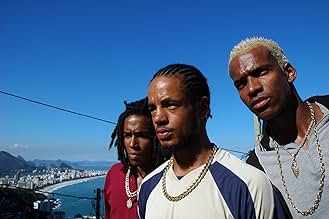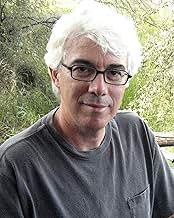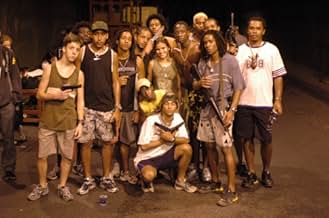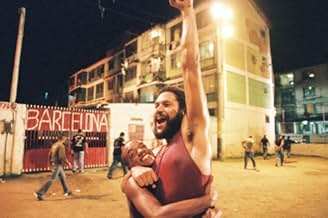Best buddies Acerola and Laranjinha, about to turn 18, discover things about their missing fathers' pasts which will shatter their solid friendship, in the middle of a war between rival drug... Read allBest buddies Acerola and Laranjinha, about to turn 18, discover things about their missing fathers' pasts which will shatter their solid friendship, in the middle of a war between rival drug gangs from Rio's favelas.Best buddies Acerola and Laranjinha, about to turn 18, discover things about their missing fathers' pasts which will shatter their solid friendship, in the middle of a war between rival drug gangs from Rio's favelas.
- Awards
- 14 nominations total
Naima Silva
- Camila
- (as Naíma Silva)
Eduardo 'BR' Piranha
- Nefasto
- (as Eduardo BR)
Featured reviews
I just saw it and despite of the rough theme is a sensitive and emotive movie, very different from City of God. City of God was frenetic, full of effects, City of Men is more traditional and the narrative is more conventional. The traffic and the violence is in the background, the theme here is the paternity. Acting is first class, music is melodious and integrate to the scenes, photograph is similar to City of God. Above the summary: Laranjinha and Acerola are preparing themselves to adult life! At the age of 18, each boy has his own problems: Child, women, family, job, forgotten wishes and dreams are some of this adventure's spices, which, to add another pinch of thrill, tells about a war on the hill that will expel the young adults from their community. Will be definite all those changes?
Having not seen 'Cidade de Deus' nor the original TV series of which this movie is a continuation, as a stand alone I found 'Cidade dos Homens' to be quite satisfying. It kept me hooked from start to finish. Paula Morelli also gives great attention to detail and captures the local life in Rio de Janeiro quite realistically. With the backdrop of a local gang war, at the core of the film lies the friendship between Laranjinha and Acerola. Their friendship is put to test when the gangwar erupts and the identities of their fathers are discovered.
The cinematography is mostly done with a hand-held digital camera that gives a spacious feel while also stressing on the dense mazelike streets of the hills. The lighting stresses on the heavy heat of Rio de Janeiro. Music also works well with the story. The overall acting is very good with young actor Douglas Silva topping the cast.
'Cidade De Deus' has heart and the strength lies in the storytelling. The portrayal of corruption and poverty in Brasil is effectively portrayed. It shows how people are surviving everyday and how even the smallest 'mistake' can risk losing their lives.
The cinematography is mostly done with a hand-held digital camera that gives a spacious feel while also stressing on the dense mazelike streets of the hills. The lighting stresses on the heavy heat of Rio de Janeiro. Music also works well with the story. The overall acting is very good with young actor Douglas Silva topping the cast.
'Cidade De Deus' has heart and the strength lies in the storytelling. The portrayal of corruption and poverty in Brasil is effectively portrayed. It shows how people are surviving everyday and how even the smallest 'mistake' can risk losing their lives.
The film City of Men is a fantastic Brazilian film. It's directed by the same creator of City of God and the City of Men TV series. Now, personally, I recommend you watch the TV series before watching the movie due to many flashbacks throughout the film. The TV series also adds more depth to the characters that add to the overall enjoyment of the film. The film is still set in the favelas in Rio, but instead of focusing on the gangs as in City of God, it focuses on two 18 year old boys. The film is similar to City of God, but with a more light-hearted feel to it. The film also has similar cinematography. Overall, I prefer City of God to this film, but it is a worthy follow up to a fantastic film. 9 stars out of 10 in relation to City of God, but as a film in general, compared to the majority of films created this would deserve 10 stars.
"City of Men" is a companion piece to Fernando Meirelles' 2002 film "City of God," but it's a much different animal from the earlier film. Both are set in the slums of Rio de Janeiro, and both are about young men fashioning lives for themselves out of the only resources available to them. But whereas "City of God" was kinetic, angry and immediate, "City of Men" is more reflective and conventional, and it comes to a much more hopeful conclusion than the earlier film.
"City of Men" is by far the weaker of the two. The carefully crafted screenplay was full of the heavy themes and plot twists of a Shakesperean tragedy, but I found myself missing the unscripted, documentary-like feel of Meirelles' film. "City of Men" is about the absence of fathers, and about two friends who find themselves fighting on opposite sides because of deeds committed by their own dads -- sons literally inheriting the sins of their fathers. But the script is too often heavy handed, and the director, Paulo Morelli, chooses to communicate too much about the lives of these people through blunt exposition. We don't learn about them from what the actors playing them do or how they act, but rather through the lines they read, and we're almost always aware that they're reading lines.
Nevertheless, the acting is strong enough that I found myself caring for the two leads and fairly engrossed in how their stories turned out. Morelli isn't as accomplished a director as Meirelles, but the film is still well directed on its own more modest terms. If I didn't already have "City of God" to compare it to, I might have liked it even more.
Grade: B+
"City of Men" is by far the weaker of the two. The carefully crafted screenplay was full of the heavy themes and plot twists of a Shakesperean tragedy, but I found myself missing the unscripted, documentary-like feel of Meirelles' film. "City of Men" is about the absence of fathers, and about two friends who find themselves fighting on opposite sides because of deeds committed by their own dads -- sons literally inheriting the sins of their fathers. But the script is too often heavy handed, and the director, Paulo Morelli, chooses to communicate too much about the lives of these people through blunt exposition. We don't learn about them from what the actors playing them do or how they act, but rather through the lines they read, and we're almost always aware that they're reading lines.
Nevertheless, the acting is strong enough that I found myself caring for the two leads and fairly engrossed in how their stories turned out. Morelli isn't as accomplished a director as Meirelles, but the film is still well directed on its own more modest terms. If I didn't already have "City of God" to compare it to, I might have liked it even more.
Grade: B+
"Poverty, to be picturesque, should be rural. Suburban misery is as hideous as it is pitiable." Anthony Trollope
Whew! I'm out of breath following youth gangs in the favela of Rio as they fight for a city hill as if they were in WWII's Pork Chop battle. Machine guns rule; women do not (contrary to the stereotype of matriarchal Latin society). It may not be City of God, the frenetic precursor using two of the same actors, but it has the Battle of Algiers' claustrophobia, which had a better-appointed Kasbah yet the same feeling of people darting around corners to avoid ever present Death.
The two central characters, teenage boys trying to keep their friendship and families in tact while around them chaos rules, veer between themselves and annihilation as they fight off the temptation to carry weapons like their friends yet can't find a way to survive without guns. There is more, however, than just gang warfare because sub-textually director/writer Paulo Morelli identifies a root cause of the dislocationsabsentee fathers. (Heck, even the current Spiderwick uses this powerful ingredient.) Much of the film is dedicated to one of the boys finding his father and the other coming to terms with the murder of his. While the former is adequately explored, the latter could have used much more explanation for the boy's suddenly joining the gang's war. Could it have been the murder of his father? I can't tell you.
The requisite hillside shots of the Rio harbor help the figurative contrast between the rich Brazilian scenery and the squalor of the barrio. Both conditions, of course, help to emphasize the globally accurate distance between the have's and the have not's, a condition the present economic global downturn is exacerbating. City of Men is a city of all men, racing through the labyrinth of life trying to survive, and losing.
City of God is a movie that contradicts its name; City of Men is spot onGod help us.
Whew! I'm out of breath following youth gangs in the favela of Rio as they fight for a city hill as if they were in WWII's Pork Chop battle. Machine guns rule; women do not (contrary to the stereotype of matriarchal Latin society). It may not be City of God, the frenetic precursor using two of the same actors, but it has the Battle of Algiers' claustrophobia, which had a better-appointed Kasbah yet the same feeling of people darting around corners to avoid ever present Death.
The two central characters, teenage boys trying to keep their friendship and families in tact while around them chaos rules, veer between themselves and annihilation as they fight off the temptation to carry weapons like their friends yet can't find a way to survive without guns. There is more, however, than just gang warfare because sub-textually director/writer Paulo Morelli identifies a root cause of the dislocationsabsentee fathers. (Heck, even the current Spiderwick uses this powerful ingredient.) Much of the film is dedicated to one of the boys finding his father and the other coming to terms with the murder of his. While the former is adequately explored, the latter could have used much more explanation for the boy's suddenly joining the gang's war. Could it have been the murder of his father? I can't tell you.
The requisite hillside shots of the Rio harbor help the figurative contrast between the rich Brazilian scenery and the squalor of the barrio. Both conditions, of course, help to emphasize the globally accurate distance between the have's and the have not's, a condition the present economic global downturn is exacerbating. City of Men is a city of all men, racing through the labyrinth of life trying to survive, and losing.
City of God is a movie that contradicts its name; City of Men is spot onGod help us.
Did you know
- TriviaJonathan Haagensen, Mumuzinho and Thiago Martins are some of the actors returning after La cité de Dieu (2002), portraying new roles.
- GoofsWhen Camila is showing Wallace her hair and telling him where Ace is, a leg of the tripod holding the close up camera is visible on the right side in the wide shot of them.
- SoundtracksFlor E O Espinho
(uncredited)
Written by Nelson Cavaquinho, Guilherme de Brito and Alcides Caminha
Originally recorded by Paulinho Moska
Sung by Rodrigo dos Santos (Heraldo) in the shower
Details
Box office
- Gross US & Canada
- $325,131
- Opening weekend US & Canada
- $130,579
- Mar 2, 2008
- Gross worldwide
- $2,589,732
- Runtime
- 1h 46m(106 min)
- Color
- Sound mix
- Aspect ratio
- 1.85 : 1
Contribute to this page
Suggest an edit or add missing content


![City Of Men [Cidade dos Homens]](https://m.media-amazon.com/images/M/MV5BMTIyMzgyNTUyMl5BMl5BanBnXkFtZTcwMzQ2NTc3MQ@@._V1_QL75_UX500_CR0)



























